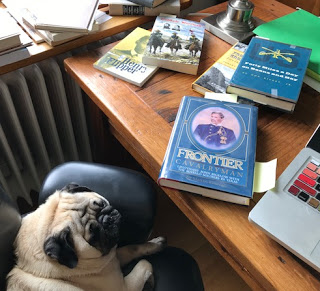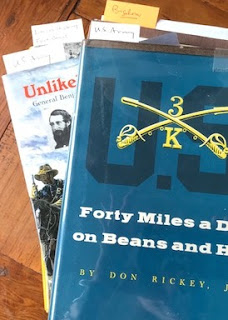
This blog posts every Monday. Starting this year, every fourth Monday, except when not, is a Q & A with another writer. This week not.

As you dear, faithful, writerly readers know, I have been at work on the Far West Texas book. One of the individuals who appears and reappears throughout the narrative is Lt. John Bigelow, Jr. An officer in the Tenth U.S. Cavalry in the late 19th century, Bigelow had an illustrious father and his own impressive body of work in military strategy and tactics, in many ways anticipating the industrial-level wars of the twentieth century. So, having done a small Himalaya of reading on those Bigelows and the Tenth Cavalry, last fall at the conference at the Center for Big Bend Studies, I presented a paper on Lt. Bigelow, expecting to polish it up into publishable form lickety-split. Ha! It’s still not finished, but at least the draft is, and I submitted it. Wish me luck.
In the meantime, herewith, a few lessons learned about working with a working library.
I’m several decades and several published books down the pike now that I pause here, en blog, to confess that I never fully appreciated what was involved with writing a book that necessitated a working library. I just sort of accumulated whatever books I needed, or thought I might need, willynilly, clearing bookshelf space, catch as catch can. Things got rather pile-y, shall we say, and sometimes I wasted good working mornings just hunting for things. I never fully appreciated how unwieldly some of these working libraries can grow– and grow as, in many cases, they rightfully must.
Some of my working libraries took up only a few shelves, for example, the reading for my anthology Mexico: A Traveler’s Literary Companion. The one for my Baja California book, Miraculous Air, took up an entire wall, floor to ceiling, and the working library for my novel on Mexico’s Second Empire almost twice as much space. Ditto my recent book on Madero and metaphysical religion. And… drumroll… most especially the one I am using now on Far West Texas. The Texasbibliothek, as I call it, now hogs and camels and elephants and Macktrucks an entire room.
You may wonder, why can’t I just borrow books from my local library? Answer, Part I: I don’t have a relevant library nearby. Part II: When I am writing I often need to have several different books at-hand; many libraries will not lend out so many books at once, nor bring out so many volumes to a reading room. (But yes, I have consulted books in libraries, and in archival collections.) As I worked on that Baja California book, the Second Empire novel, and the one on the Mexican Revolution, I often had five or ten or even as many as, say, fifteen books open on my desk… such is the Kuddelmuddel of my process.
So… for the types of books I was and am writing, this means having a budget– a realistic budget– for buying books. University press hardcovers can be, ouch. To save money, many a time I bought an ex-library edition off of www.abebooks.com— which for used books is, in my experience, more reliable than amazon or ebay. And for collectible editions, I would advise steering way clear of amazon and ebay because all sorts of sellers on there have no clue what a first edition is or how to accurately describe a book’s condition. Again, abebooks.com is good and better yet sellers who are members in good standing of the Antiquarian Booksellers Association of America. An occupational danger is that you can get a jones for collecting, and start buying first editions. But that’s another blog post. I used to buy Italian shoes, let me put it that way.
As for organizing these working libraries, I posted previously about that here. Indeed, I got this current working library, my Texasbibliothek, into such superb shape that, as I was pulling out various titles for this paper on Lt. Bigelow, I had a little fiesta of self-congratulation every single time.

And reshelving the books? Something I do now with this Texasbibliothek that I have never done before– and I am shaking my head that it had not occurred to me sooner– is to tuck into each book a bookmark with its category.
UPDATE: See my November 11, 2019 post “A Working Library” for more about using bookmarks. My technique has advanced!
Making individual bookmarks with the categories noted might seem more trouble than it’s worth, but the challenge is, many books could go into more than one category, and if I have to remember or decide anew which one it is each time I reshelve it, well…. then… unshelved books tend to start piling up and sprawling into big, giant, King-Kong-scale Kuddelmuddel!
Decluttering? Indeed I do declutter. However, for some subjects, as in these working libraries, the collections in themselves have significant cultural / scholarly value; they should not be broken up. One day I will find them a good home.
What is Kuddelmuddel?
Not to be confused with Kugel Mugel.

Q & A: Lynn Downey “Research Must Serve the Writer, Not the Other Way Around”
On Writing About Mexico: Secrets and Surprises
This Writer’s Distraction Free Smartphone (Plus an App Evaluation Flowchart to Tailor-Make Your Own)
Find out more about C.M. Mayo’s books, shorter works, podcasts, and more at www.cmmayo.com.

